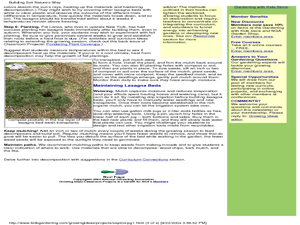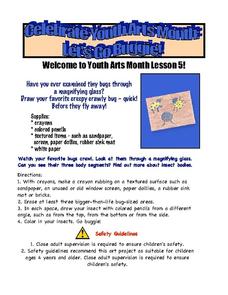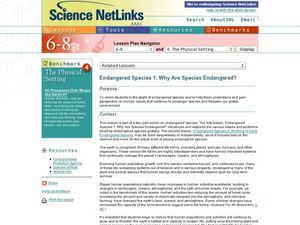Baylor College
Plant Parts You Eat
Plants provide a variety of delicious foods essential for human survival. In the fourth lesson of this series on food science, young scientists investigate common fruits, vegetables, and grains in order to determine which plant part is...
Curated OER
Energy At Play
If you can find Tinker Toys™, then this may be a fun assignment for your physical science class. Using the construction set and a few other toys, they examine the forces involved when it they are being played with. For each, they...
Curated OER
Pet Perspective
Discuss point of view through a familiar medium: your pet! Learners write a story from the perspective of their own or the class pet. Prompts such as "My Family" (or "My Class"), "My Day," and "A Day in the Life of a _________" help...
Curated OER
Building Soil Nature's Way: Exploring decomposition and soil health
Students explore decomposition and soil health by creating their own garden. In this agriculture lesson, students build a "lasagna garden" with organic matter found in the area and plant perennials native to their region. Students are...
BBC
Light and Shadows
Light is such an amazing thing! Elementary schoolers explore the wonderful world of light and shadow. The lesson is meant to be carried out on a whiteboard. Objects are placed in front of a light source, and learners must predict what...
Curated OER
Where are Koalas on the Food Chain?
Take a field trip to observe Koalas, absolutely! Budding scientists become familiar with the Koala's position in the food chain. They answer questions based on what they see and draw a food chain explaining the Koalas position. Tip: A...
Purdue University
What a Waste of Food!
Follow the life of an apple from harvest to the consumer. A three-part lesson describes the different steps to get an apple from the farmer to your kitchen and the approximate waste that happens at each step. They discuss the process and...
Curated OER
Levers and Wedges in the Human Body
Learners identify the various parts of the body that serve as wedges and levers, identifying the fulcrum for each body lever. They bite into carrots and apples to analyze how their jaws and teeth work, then complete three worksheets that...
Purdue University
Food Waste Solutions
Easy doesn't always mean better. In an era with pre-packaged everything, learners consider the environmental impact of the convenient trend. They critique the packaging of food and how waste impacts cost and then look for solutions.
Curated OER
Bursting Blooms- Create an Early Spring
Students prune a tree. In this gardening lesson, students select a shrub or tree that has a lot of flower buds and use sharp pruners to cut sections of branches. Students place the cuttings into cool water and move into a bright...
Arts & Humanities
Let's Go Buggie!
To celebrate art youth month, little ones get out the magnifying glasses and get close-up with bugs. They make scientific observations of bugs you bring into the classroom. Then, they use markers, clay, paint, or crayons to make artistic...
Curated OER
Under the Sea - KWL Chart
Students create a KWL chart to start the discussion on ocean animals. They practice sorting the animals into their different classifications. They use indexes, table of contents and glossary to find information.
University of Wisconsin
Identifying Your Soil for Rain Gardens
Teach your class the descriptive characteristics of soil. Provide information about particle size and a flow chart for assessing texture. Soil scientists then analyze samples and hypothesize which would be the best type for a rain...
National Institute of Food and Agriculture
Water Pollution Demonstration
Water pollution is everywhere, and pollutants range from oil to fertilizers. Bring the concept to life by demonstrating the difficulties in getting particular pollutants out of water.
Curated OER
Hatching Chickens
Students observe chickens hatching in a classroom incubation environment In this egg-hatching lesson plan, students make observations of the hatching process and later care for the hatched chickens.
Curated OER
Endangered Species 1: Why are Species Endangered?
Emerging ecologists examine endangered species by visiting the US Environmental Protection Agency website. They consider human contribution to the decline of different species. They research an endangered animal and then craft a poster...
Curated OER
The Layers of the Rainforest
Fourth graders identify the different layers of the rainforest and distinguish between the plant and life forms that go along with each layer. They access websites imbedded in this plan and answer questions and draw pictures of plants...
Curated OER
Home Sweet Home
Students explore marine turtle habitats. Students research one species of marine turtle found in the Gulf of Mexico. They identify plants and animals in the habitat. They create a model or replica using information gathered through their...
Curated OER
Watershed Protection
Students explore environmental care by participating in an Earth science activity. For this clean water lesson, students discuss what a watershed is, how they become polluted, and how it affects the overall quality of drinking water....
Curated OER
Urban Ecosystems 4: Metabolism of Urban Ecosystems
Cities are compared to living, breathing, metabolizing organisms. Fourth in a five-part series of lessons, this one focuses on the flow of materials through a city. Links to interesting websites and images make your delivery of...
Curated OER
Weather and Water in Ghana
Students research the rainy and dry season to investigate Africa's weather. In this African weather lesson, students use the given websites to research the rainy and dry seasons of Ghana in Africa. Students then read stories about life...
Curated OER
Blazing Gas
Fourth graders read and discuss the sun and the energy we use on Earth from the sun. In this sun lesson plan, 4th graders discuss the solar system, planets, and answer short answer questions.
Curated OER
Breathe In, Breathe Out
Students study the respiratory system, the lungs and air. In this respiratory instructional activity students describe technologies that engineers have found that improve the health of the respiratory system.
Curated OER
Going in Cycles: The Life of an Aluminum Can
Students explore the life cycle of aluminum cans. In this recycling instructional activity, students review the manufacturing process and how to make a closed loop cycle. Students also have the opportunity to present what they've...

























